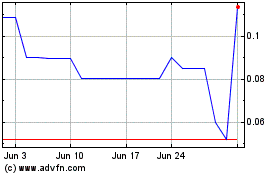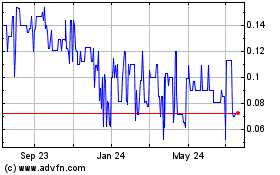International Stem Cell Corporation Executive Receives Bioscience Chief Scientific Officer of the Year Award
March 27 2018 - 8:45AM
InvestorsHub NewsWire

The Company is
valued at $33 million ($5.52 per basic share) by Edison Investment
Research*
Carlsbad, CA --
March 27, 2018 -- InvestorsHub NewsWire -- International Stem Cell
Corporation (OTCQB:ISCO),
a California-based clinical stage biotechnology company developing
stem cell-based therapies and biomedical products, announced today
that its Executive Vice President and Chief Scientific Officer
Russell Kern, PhD has been awarded Bioscience Chief Scientific
Officer of the Year 2018 – USA by Global Health and Pharma (GHP)
Magazine.
Recently, ISCO announced strong interim
results of its Parkinson’s disease clinical study at the Society of
Neurosciences Annual Meeting held in Washington
DC.
About the clinical
study
The Phase I clinical study is a dose
escalation safety and preliminary efficacy study of ISC-hpNSC®,
intracranially transplanted into patients with moderate Parkinson's
disease. The open-label, single center, uncontrolled clinical trial
will evaluate three different dose regimens of 30,000,000 to
70,000,000 neural cells. A total of 12 participants with
moderate-to-severe Parkinson's disease will be treated. Following
transplantation, the patients will be monitored for 12 months at
specified intervals to evaluate the safety and biologic activity of
ISC-hpNSC®. A PET scan will be performed at baseline, as part of
the screening assessment, and at 6 and 12 months after surgical
intervention. Clinical responses compared to baseline after the
administration of ISC-hpNSC® will be evaluated using various
neurological assessments such as Unified Parkinson Disease Rating
Scale (UPDRS), Hoehn and Yahr and other rating scales. An extension
phase of the study will evaluate patients every 6 months for 5
additional years.
About Parkinson's
disease
Parkinson's disease is a degenerative
disorder of the central nervous system mainly affecting the motor
system. The motor symptoms of Parkinson's disease result from the
death of dopamine-generating cells in the substantia nigra, a
region of the midbrain. Early in the course of the disease, the
most obvious symptoms are movement-related. These symptoms include
shaking, rigidity, slowness of movement and difficulty with walking
and gait. Later, thinking and behavioral problems may arise, with
dementia commonly occurring in the advanced stages of the disease,
and depression as the most common psychiatric symptom. Parkinson's
disease is more common in people over the age of
50.
There are no
approved treatments that restore the damaged dopaminergic neurons.
Medications typically used in the treatment of Parkinson's disease,
levodopa and dopamine agonists, improve the early symptoms of the
disease. As the disease progresses and dopaminergic neurons
continue to be lost, the drugs eventually become ineffective, while
at the same time frequently producing a complication marked by
involuntary writhing movements. There are over 10 million people
afflicted by Parkinson's disease worldwide. In 2013 Parkinson's
disease resulted in about 103,000 deaths globally, up from 44,000
deaths in 1990.
About
ISC-hpNSC®
International Stem Cell Corporation's
proprietary ISC-hpNSC® consists of a highly pure
population of neural stem cells derived from human parthenogenetic
stem cells. ISC-hpNSC® is a
suspension of clinical grade cells manufactured under cGMP
conditions that have undergone stringent quality control measures
and are clear of any microbial and viral contaminants. Preclinical
studies in rodents and non-human primates have shown improvement in
Parkinson's disease symptoms and increase in brain dopamine levels
following the intracranial administration of
ISC-hpNSC®.
ISC-hpNSC® provides
neurotrophic support and neuroregeneration to the dying
dopaminergic neurons of the recipient Parkinson's disease brain.
Additionally, ISC-hpNSC® is
safe, well tolerated and does not cause adverse events such as
dyskinesia, systemic toxicity or tumors in preclinical models.
International Stem Cell Corporation believes that
ISC-hpNSC® may
have broad therapeutic applications for many neurological diseases
affecting the brain, the spinal cord and the eye.
*The Edison report was sponsored by the
Company
Safe harbor
statement
Statements pertaining to
anticipated developments, expected pre-clinical studies (including
timing and results), progress of research and development, and
other opportunities for the company and its subsidiaries, along
with other statements about the future expectations, beliefs,
goals, plans, or prospects expressed by management constitute
forward-looking statements. Any statements that are not historical
fact (including, but not limited to statements that contain words
such as "will," "believes," "plans," "anticipates," "expects,"
"estimates,") should also be considered to be forward-looking
statements. Forward-looking statements involve risks and
uncertainties, including, without limitation, risks inherent in the
development and/or commercialization of potential products,
regulatory approvals, need and ability to obtain future capital,
application of capital resources among competing uses, and
maintenance of intellectual property rights. Actual results may
differ materially from the results anticipated in these
forward-looking statements and as such should be evaluated together
with the many uncertainties that affect the company's business,
particularly those mentioned in the cautionary statements found in
the company's Securities and Exchange Commission filings. The
company disclaims any intent or obligation to update
forward-looking statements.
Contact:
International
Stem Cell Corporation
Dr.
Russell Kern
EVP, Chief Scientific Officer
(760) 940-6383
ir@intlstemcell.com
International Stem Cell (QB) (USOTC:ISCO)
Historical Stock Chart
From Mar 2024 to Apr 2024

International Stem Cell (QB) (USOTC:ISCO)
Historical Stock Chart
From Apr 2023 to Apr 2024
